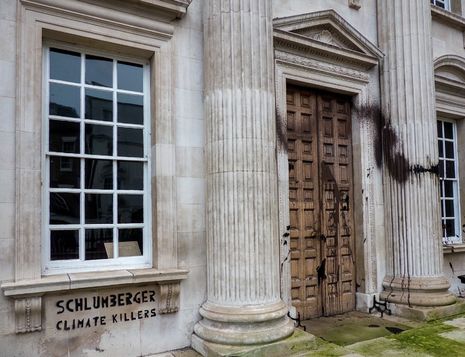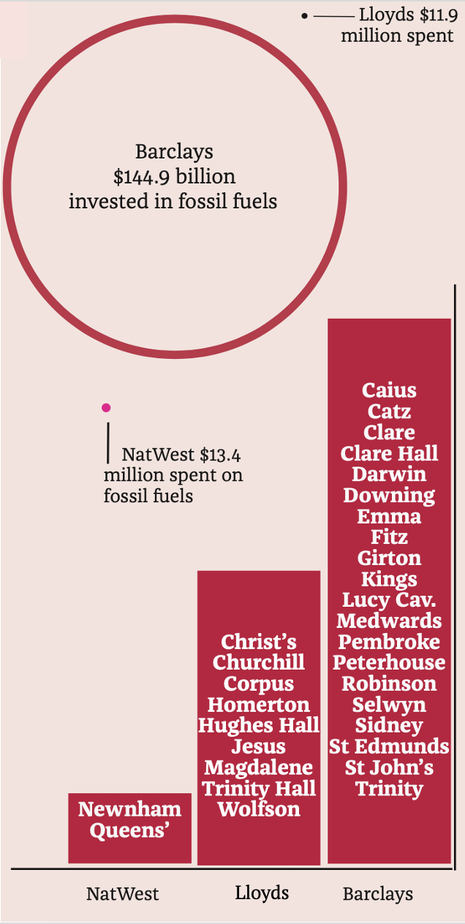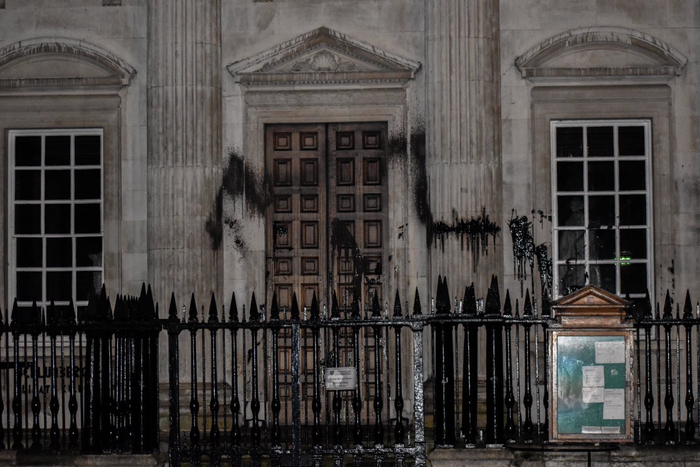Colleges caught banking with Europe’s biggest fossil fuel investor
Barclays, the primary banker for 65% of colleges, has spent $144.9 billion on fossil fuels since 2016

A majority of colleges bank with Europe’s biggest fossil fuel investor, a Varsity investigation can reveal.
Twenty of the thirty-one colleges bank with Barclays, which a recent report showed is Europe’s biggest spender on fossil fuels. Since the Paris Climate Agreement in 2015, Barclays has invested over $144.9 billion in fossil fuels - the seventh highest in the world, nearly as much as the GDP of Qatar in 2020.
Student Union President Zak Coleman said that “students should be furious that so many colleges are lending social legitimacy to banks like Barclays in the face of an escalating climate emergency that these banks’ policies are directly fuelling.”
Lloyds, the second most popular bank with Cambridge colleges, has spent $11 million on fossil fuel investments - 100 times less than Barclays.
A group of Oxbridge students who aim to get major UK banks to cut their ties with the fossil fuel and arms industries, Boycott Banks’ Destruction, have called for the university and colleges to cut ties with the worst offending banks HSBC, Lloyds, Barclays and NatWest over their “exceptionally poor ethical track records”. All thirty-one Cambridge colleges bank with one of them.

The group said: “It is outrageous that the money paid to the colleges by students is being used to support these types of investments. The banking sector must divest in fossil fuels, and our institutions should use their influence to enforce this change. If the university and colleges are serious about reaching net zero then they must ensure that none of their activities are used to exacerbate the climate crisis.”
Fitzwilliam College told Varsity that they expect the banks they work with to align with their social and environmental values. They said that conversations were already underway with Barclays regarding its environmental record, and that if action isn’t taken, they will consider swapping.
St Catharine’s College, who also bank with Barclays, state on their website that they would also consider switching banks if Barclays continues to clash with their values. They did not respond to Varsity for comment.
Coleman added, “As with divestment, there is clear evidence that the strategy of ‘influence from within’ is far, far less effective than publicly cutting ties with these banks. So if colleges are truly serious about tackling climate breakdown, they must urgently sever ties with Barclays and other top fossil fuel funding banks until they commit to ending all current and future fossil fuel financing.”
The news follows a recent protest by Extinction Rebellion over the University’s ties with the oil company Schlumberger.
All colleges were contacted for comment and all, bar Fitzwilliam, declined to comment. As did Barclays bank.
 News / Judge Business School advisor resigns over Epstein and Andrew links18 February 2026
News / Judge Business School advisor resigns over Epstein and Andrew links18 February 2026 News / Hundreds of Cambridge academics demand vote on fate of vet course20 February 2026
News / Hundreds of Cambridge academics demand vote on fate of vet course20 February 2026 News / Petition demands University reverse decision on vegan menu20 February 2026
News / Petition demands University reverse decision on vegan menu20 February 2026 News / CUCA members attend Reform rally in London20 February 2026
News / CUCA members attend Reform rally in London20 February 2026 News / Caius students fail to pass Pride flag proposal20 February 2026
News / Caius students fail to pass Pride flag proposal20 February 2026










